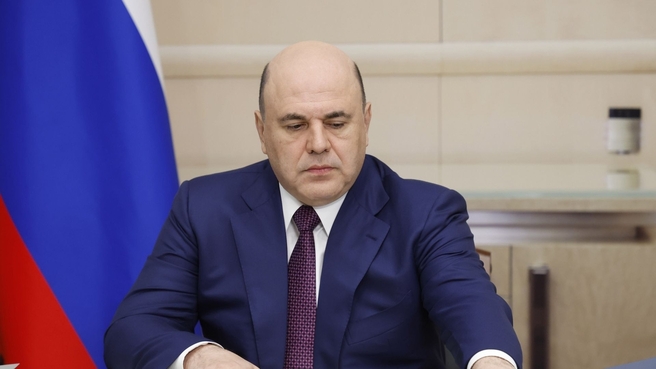Agenda: the Charter of the Defenders of the Fatherland State Fund for Supporting Participants in the Special Military Operation, supporting baby and medical foods production, supporting the development of regional housing and utility systems, and expanding energy cooperation with China.
Mikhail Mishustin’s opening remarks:
Good afternoon, colleagues,
The Government has approved the Charter of the Defenders of the Fatherland State Fund for Supporting Participants in the Special Military Operation, established on the initiative of the President.
The document lists the governing bodies, the procedure for establishing them, as well as the fund’s competences and goals.
First of all, this involves comprehensive support for the families of those killed in action and veterans of the special military operation. It also includes assistance for our defenders in obtaining social support measures, essential medications and medical devices, technical rehabilitation systems, vouchers for health centres and home care, as well as education, advanced training and employment opportunities and, of course, psychological counselling.
They will also receive assistance with paperwork and obtaining the status of combat veterans.
This work will involve federal, regional and local government agencies, various social and medical institutions, and volunteer organisations.
Caring for our defenders is our common task.
The fund and its branches will operate in all regions of the Russian Federation, and they should provide effective and essential assistance, depending on the personal situations of applicants. Colleagues, please keep an eye on this process in every region.
Next issue. A resolution was signed that will help develop an important area of the food and processing industry. We provided a package of measures to support the domestic production of baby food. From now on, it will be possible to extend the previously issued loans taken to create production facilities to produce powdered milk formulas for babies, from 8 to 12 years.
Particular attention has also been given to our citizens with orphan diseases. The President emphasised that through therapy and other possible methods, we can improve the quality of life for people who suffer from these diseases.
Today, only one-seventh of medical nutrition for them, including special formulas, is produced in our country. The lack of medical foods reduces the effectiveness of the treatment of many diseases, such as tuberculosis, diabetes and others.
It is important to increase domestic production of medical foods. We will make preferential investment loans more accessible for the companies that are building or upgrading their production capacities; we will increase the amount of subsidies for such loans. These measures will make it possible to complete the already launched projects faced with a disruption in the supply of equipment due to the sanctions from unfriendly states.
Now let’s get down to the agenda.
We will consider legislative changes that will help the regions more effectively resolve issues related to housing, utilities and amenities. This matter deserves particular attention. It is necessary to actively create modern infrastructure and upgrade heat and water distribution systems, something I talked about in detail during my report to the State Duma.
At the President’s instruction, a long-term comprehensive programme to upgrade housing and utilities is being developed, funded from various sources, including extrabudgetary sources. For the construction or renovation of such facilities, the regions can also attract investment within public-private partnerships.
Today we will also discuss amendments to the law On Concession Agreements, which are aimed at improving the procedure for conducting tenders and transferring housing and utilities infrastructure to reliable companies capable of ensuring the uninterrupted provision of the relevant services to citizens.
To do this, a mandatory amount for a deposit and basic requirements are established that confirm the qualification of a company, which will allow selecting the most financially stable, and most importantly, competent companies to implement these projects, who will be able to fulfill their obligations in full and in a timely manner.
These requirements will provide a transparent mechanism for attracting private investors to the construction and renovation of utility infrastructure. And citizens will receive quality services.
Today we will also consider expanding energy cooperation with China. Our partnership in this area has now acquired a strategic character. The percentage of transactions in national currencies is growing, and long-term large joint projects are being implemented.
During China’s President Xi Jinping’s state visit to Russia in March, the President noted that great opportunities are opening up in the gas sector. Cooperation will also be improved through the implementation of the intergovernmental agreement on laying a gas pipeline along the Far Eastern route, concluded in January.
When this gas pipeline starts operating at full capacity, Russian gas exports to China will increase by 10 billion cubic metres per year.
Today we will discuss the ratification of this important document. It defines the main terms and conditions for cooperation between the two countries, including when designing, constructing and operating this new gas pipeline infrastructure. In particular, it introduces a simplified procedure for personnel and equipment to cross the state border.
The implementation of the agreement will be beneficial to both parties and will give an additional impetus to the social, economic and technological development of our Far Eastern regions.













